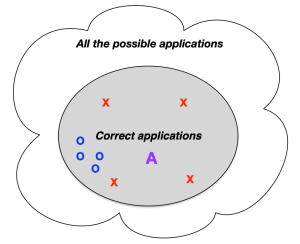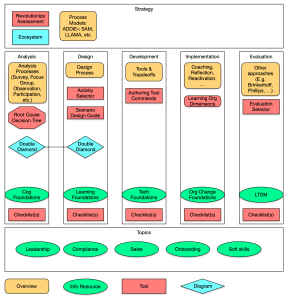(Have I talked about looking across contexts for learning before? I looked and couldn’t find it. Though I’m pretty good about sharing diagrams?!? So, here it is; if again, please bear with me).
In our recent learning science conference, one topic that came up was about contexts. That is, I suggest the contexts we see across examples and practice define the space of transfer. We know that contextual performance is better than abstract (c.f. Bransford’s work at Vanderbilt with the Cognitive Technology Group). The natural question is how to choose contexts. The answer, I suggest, is ad hoc: choose the minimal set of contexts that spans the space of transfer. What we’re talking about is looking for a set chosen across contexts that support the best learning.
 So, in talks I’ve used the diagram to say that if you choose the set of contexts represented by the ‘o’s, you’ll be unlikely to transfer to A, whereas if you choose the ‘x’s, you’re much more likely. Let me make that concrete: let’s talk negotiation (something we’re all likely to experience). If all your contexts are about vendors (e.g. ‘o’s,) you may not apply the principles to negotiating with a customer, A. If, however, you have contexts negotiating with vendors, customers, maybe even employers (‘x’s), you’re more likely to transfer to other situations. (Though your employer might not like it! ;)
So, in talks I’ve used the diagram to say that if you choose the set of contexts represented by the ‘o’s, you’ll be unlikely to transfer to A, whereas if you choose the ‘x’s, you’re much more likely. Let me make that concrete: let’s talk negotiation (something we’re all likely to experience). If all your contexts are about vendors (e.g. ‘o’s,) you may not apply the principles to negotiating with a customer, A. If, however, you have contexts negotiating with vendors, customers, maybe even employers (‘x’s), you’re more likely to transfer to other situations. (Though your employer might not like it! ;)
The point that was asked was how to choose the set. You can be algorithmic about it. If you could measure all dimensions of transfer, and ensure you’re progressing from simple to complex along those, you’d be doing the scientific best. It might lead you to choose too many, however. It may be that you can choose a suite based upon a more heuristic approach to coverage. Here I mean picking ones that provide some substantive coverage based upon expertise (say, from your SME or supervisors of performance). I suspect that you’ll have to make your best first guess and then test to see if you’re getting appropriate transfer, regardless.
It’s important to ensure that the set is minimal. You don’t want too many contexts to make the experience onerous. So pick a set that spans the space, but also is slim. The right set will illuminating the ways in which things can vary without being too large. Another criteria is to have interesting contexts. You are, I’ll suggest, free to exaggerate them a little to make them interesting if they’re not inherently so.
You may also need some times when the context says not to use the focus here. What I mean is that while it could seem appropriate to extend whatever’s being learned to this situation, you shouldn’t. Some ideas support over-generalization, and you’ll need to help people learn where those limits are.
Note that the contexts are those across both examples and practice. So, learners will see some contexts in examples, then others in practice. It may be (if it’s complex, or infrequent, or costly) that you need to have lots of practice, and this isn’t a worry. Still, making sure you’re covering the right swatch across contexts will support achieving the impact in all appropriate situations.
I’m less aware of research on the spread of contexts for transfer (PhD topic, anyone?), and welcome pointers. Still, cognitive theory suggests that this all makes sense. It does to me, how about you?

